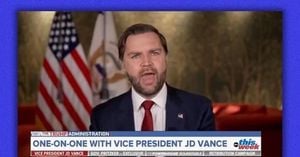As the UK grapples with the implications of recent US tariff announcements, the economic landscape is shifting, prompting concerns about future tax rises and growth prospects. While the UK is less exposed to these tariffs compared to its European counterparts, the combination of a weaker global economy and rising domestic pressures is creating a complex scenario for the Treasury.
According to a report published by ING on April 15, 2025, the UK economy's vulnerability to US tariffs is notably lower than that of the eurozone. Britain’s exports to the US account for a little over 2% of its GDP, in contrast to approximately 3% in the eurozone and nearly 4% in Germany. This statistic indicates that while tariffs are not an isolated threat, they compound existing economic challenges.
The UK government is currently prioritizing diplomacy in its approach to the US, advocating for a narrow, services-focused trade deal that could potentially mitigate the impact of these tariffs. However, the likelihood of securing exemptions remains uncertain, especially as the US administration appears to rely on sustained tariffs to bolster tax revenues.
As the situation stands, the immediate economic repercussions of the tariffs may seem manageable, particularly outside the automotive and pharmaceutical sectors. Yet, the broader implications could be severe if the US or eurozone were to slip into recession. Although this is not the current expectation, any shift in global demand could significantly affect the UK economy more than the direct tariffs themselves.
In April 2025, the UK implemented a substantial tax rise on employers, which has yet to result in increased redundancies. The government is also ramping up real-terms spending, providing a positive tailwind for economic activity. Nevertheless, the Chancellor faces a daunting task in convincing the independent Office for Budget Responsibility (OBR) to revise its medium-term growth forecasts upward, which is critical for maintaining fiscal flexibility.
Despite a small windfall from lower Bank of England expectations—helping to reduce debt interest projections—the rise in gilt yields since the OBR's last projections complicates matters. The UK’s public finances are operating under increasingly fine margins, where even minor forecast adjustments can significantly impact the Treasury’s limited maneuverability.
Given the current environment, further spending cuts appear unrealistic. The recent Spring Statement indicated a tightening of fiscal policy, but the government may find itself needing to enhance spending plans in the upcoming Autumn Budget. Adjusting the primary fiscal rule to create more flexibility also seems unlikely, especially after changes made last October.
Consequently, the expectation is that tax increases are becoming increasingly inevitable. The report highlights that the UK’s GDP growth forecasts have been revised downwards, with anticipated growth of only 1% in 2025 and a further decline to 0.9% in 2026. This adjustment reflects the anticipated drop in US demand for UK goods due to increased costs and a significant real income shock affecting US consumers.
Moreover, the forecast for UK non-fuel goods exports at the end of 2026 is now projected to be over 5% lower than earlier estimates from March 2025. This decline underscores the potential for a prolonged period of trade policy uncertainty to dampen business sentiment, particularly at a time when profitability is already under pressure.
In light of these developments, the Bank of England is expected to lower interest rates by another 75 basis points this year, with the Bank Rate projected to settle at 3.75% by the end of 2025. Although the tariff increases represent a demand shock to the UK economy, concerns regarding supply weakness may prompt the Monetary Policy Committee to adopt a more cautious stance.
As the UK navigates these turbulent economic waters, the interplay between tariffs, domestic tax policies, and global economic conditions will be critical in shaping the future. The government's ability to maintain fiscal stability while fostering growth will be tested in the coming months, as stakeholders from various sectors watch closely for signs of recovery or further decline.
In conclusion, while the UK is currently less susceptible to US tariffs than its European neighbors, the broader economic implications cannot be ignored. The combination of rising tariffs, potential tax increases, and a subdued growth forecast presents a challenging environment for the UK Treasury and its economic strategy moving forward.





